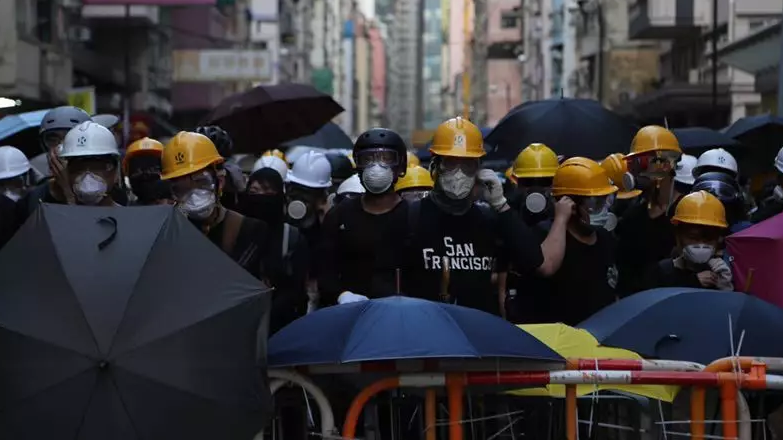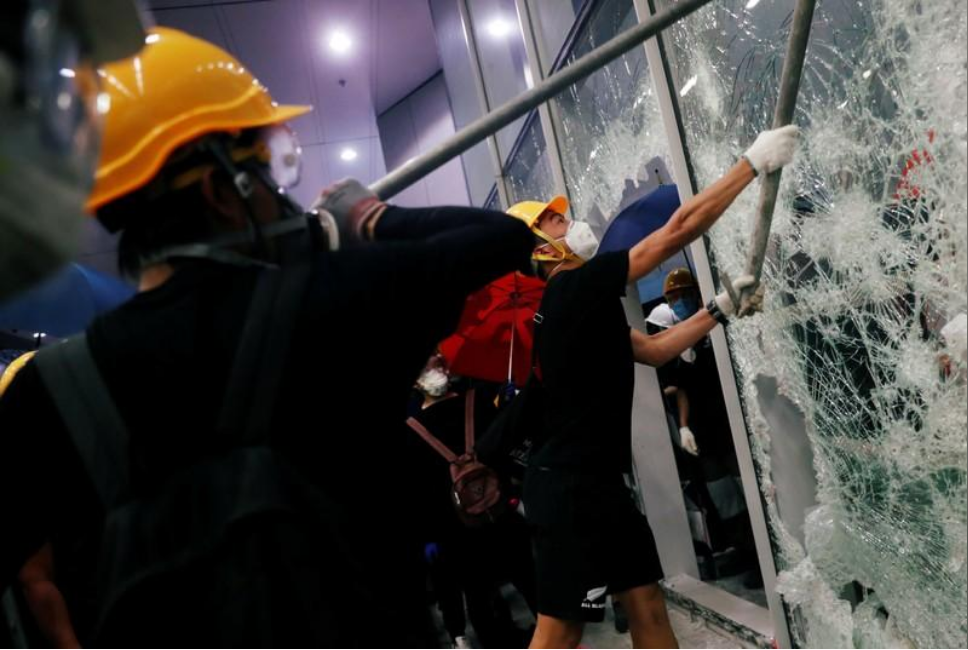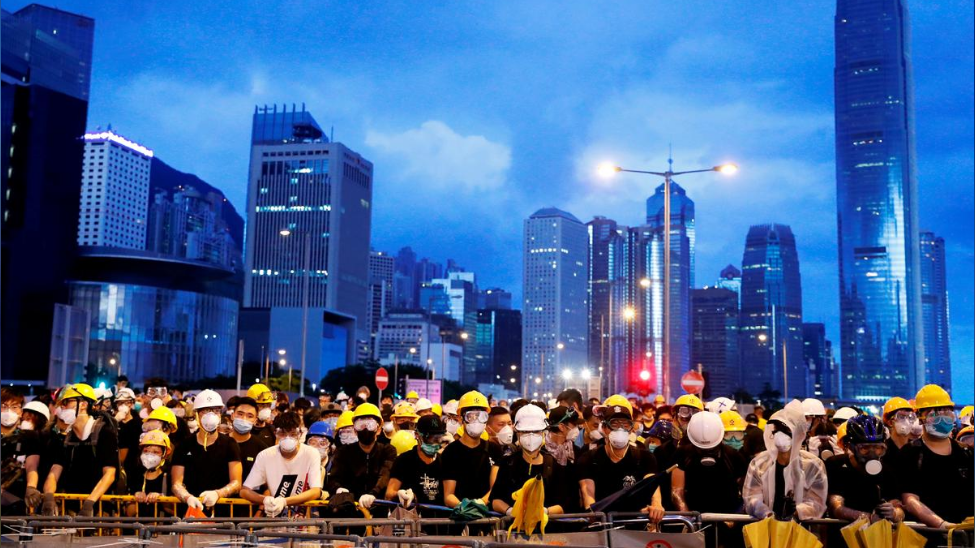

Editor's note: Grenville Cross, a senior counsel and law professor, was previously the Director of Public Prosecutions of Hong Kong Special Administrative Region, China. The article reflects the author's opinions, and not necessarily those of CGTN.
As the Hong Kong Special Administrative Region (HKSAR) faces continuing unrest, it is being stoked not only by local fanatics, but also by outsiders who wish China harm. Former governor Chris Patten must, of course, bear some responsibility for the problems that have arisen.
Never happier than when stirring things up, he has now ramped up his efforts. He has not only called for a commission of inquiry, but also for it to be given "an immediate remit to report on what happened in Yuen Long and at the end of the demonstration on Sunday."
Patten, of course, has conspicuously ignored the thorough police investigation into the Yuen Long MTR station attacks, which is already underway and has resulted so far in the arrest of 12 suspects.
Patten's proxy, the former chief secretary, Anson Chan Fang On-sang, has, meanwhile, been mischievously calling for a commission of inquiry into police handling of the riot on June 12, when extremists, after attacking the police lines with metal rods and bricks, tried to storm the Legislative Council building.
Although Chan's call has been echoed by other gullible individuals, its purpose is misguided. It is not designed to establish what happened and why, but to distract attention from the excesses of the mobs, which provoked the confrontations in the first place.
The advocates of a commission, therefore, hope to place the police, rather than the aggressors, under suspicion. They want to weaken police morale and undermine their effectiveness at a crucial time, making it easier for the extremists to continue causing chaos.
A commission, quite clearly, is a distraction, intended to challenge the forces of law and order, and thereby weaken the rule of law.

Anti-fugitive bill protesters break into the Legislative Council building during the anniversary of Hong Kong's return to China, Hong Kong SAR, China, July 1, 2019. /Reuters Photo
Patten, of course, as a seasoned political operator, fully appreciates all this. Indeed, even before the current troubles began in June, he was engaging in scaremongering and trying, as always, to whip up anti-China sentiments.
He even recorded a video, which was widely distributed in Hong Kong, in which he misrepresented the purpose of the much-needed fugitive bill amendments, and sought to inflame the situation.
Patten claimed that the absence of fugitive arrangements between Hong Kong and Chinese mainland was a "firewall," but this is absurd. Far from being a firewall, the current vacuum has been a godsend for criminals from all over China, and elsewhere, who have obtained safe haven in Hong Kong.
The presence of large numbers of fugitive offenders is not only shameful for Hong Kong, but an affront to our criminal justice partners around the world, who look to us for the return of their criminal suspects.
Thanks to Patten, Chan and their allies, Hong Kong is now Asia's weak link in global efforts to combat transnational crime.
It is little wonder, therefore, that the spokesperson for the Chinese Foreign Ministry Hua Chunying has called on Patten to "shut up and back down." As she rightly pointed out, when calling for a commission, Patten "chose to turn a blind eye and avoid talking about the riots, striking at the foundation of the rule of law in Hong Kong."
Patten, as always, has been highly selective, hoping to make political capital out of the situation. He has arbitrarily focused on particular incidents, to the exclusion of others, disregarding the wider picture.
Although he wants the Yuen Long incident to be investigated by a commission, he has not called for anything similar following the discovery of a terrorist arsenal in Tsuen Wan. Neither has he proposed an inquiry into the smashing up of the legislature, let alone into the mayhem in Sheung Shui, Shatin and Yuen Long, where armed mobs attacked police and terrorized locals and mainlanders alike. One does not need to be a genius to know why.
However, notwithstanding his obvious bias, Patten's call has now been echoed by the naive. A faction of radicalized lawyers, for example, grandly describing themselves as "the Hong Kong Legal Profession," issued a statement, regurgitating Patten's demand. They also bizarrely threatened the HKSAR government with the private prosecution of senior police officers, if it does not buckle to their demands.

Anti-fugitive bill protesters stand behind a barricade during a demonstration near a flag-raising ceremony for the anniversary of Hong Kong's return to China in the Hong Kong SAR, China, July 1, 2019. /Reuters Photo
No lawyer worth his salt would lend his name to such demands, not least because, even if private prosecutions of that sort were legally viable, which they are not, they would be nipped in the bud as an abuse of process, if not by the department of justice, then by the courts.
This apart, the statement's initiators are not serious players. Indeed, one prominent signatory was none other than the Civic Party's former chairman, Alan Leong Kah-kit. Leong's most notable contribution to solving our current difficulties was to tell Hong Kong University students in mid-July that "violence may sometimes be a solution to the problem."
Another signatory was Civic Party legislator, Dennis Kwok Wing-hang. Kwok, on his now notorious visit to Washington DC in March, cozied up to every sinophobe in sight, hoping for their support. He then delighted his hosts by bad-mouthing not only the HKSAR government, but also the central authorities.
The Civic Party itself has exercised no leadership in the crisis, and its attempts to curry favor with the fanatics have served only to expose its moral bankruptcy. The likes of Patten, Chan, Leong and Kwok clearly have nothing constructive to offer Hong Kong, and are only interested in promoting disharmony.
No concessions of any sort must be made to them, let alone to the armed thugs who are regularly attacking the police and causing havoc throughout Hong Kong. The HKSAR government must provide the police with every possible support, and do whatever it takes to bring an end to the insurrection.
After all, the police are the true heroes of this crisis. They have repeatedly put their lives in danger in defense of Hong Kong, often without the plaudits they deserve.
If there were to be any inquiry, it would need to focus on who organized the riots, which groups are financing the disruption, and the extent to which local activists have colluded with foreign agencies to destabilize Hong Kong. The answers, however, would not be hard to find.
The HKSAR government must hold its nerve, resist unreasonable demands, and protect Hong Kong from those who do not wish it well.
(If you want to contribute and have specific expertise, please contact us at opinions@cgtn.com.)

Copyright © 2018 CGTN. Beijing ICP prepared NO.16065310-3
Copyright © 2018 CGTN. Beijing ICP prepared NO.16065310-3